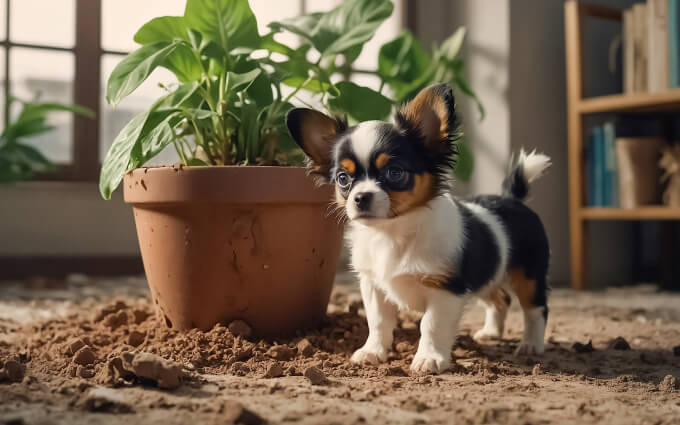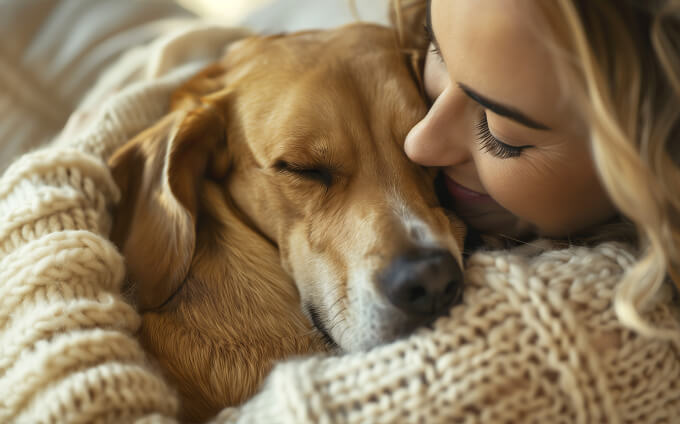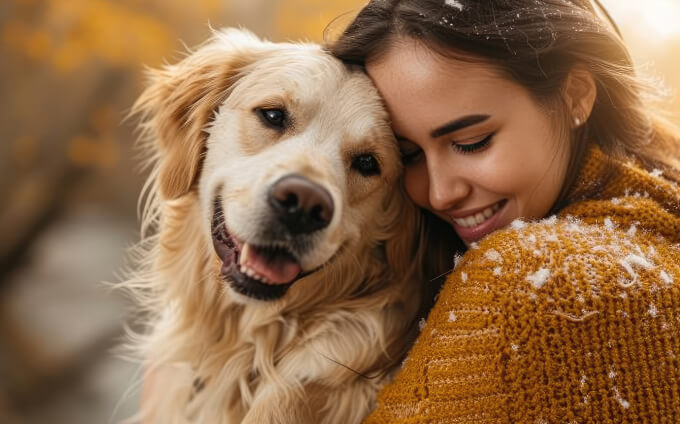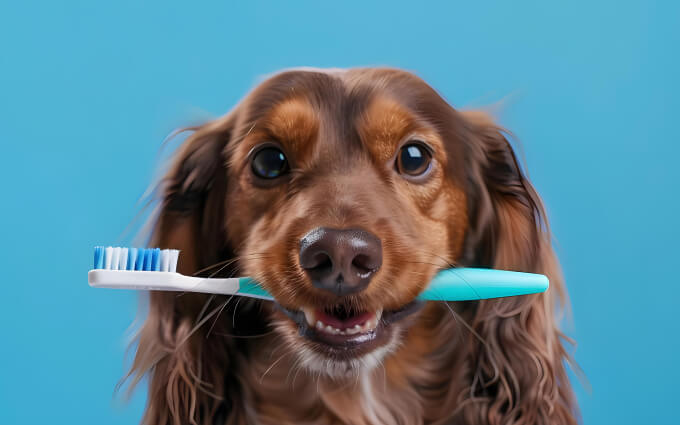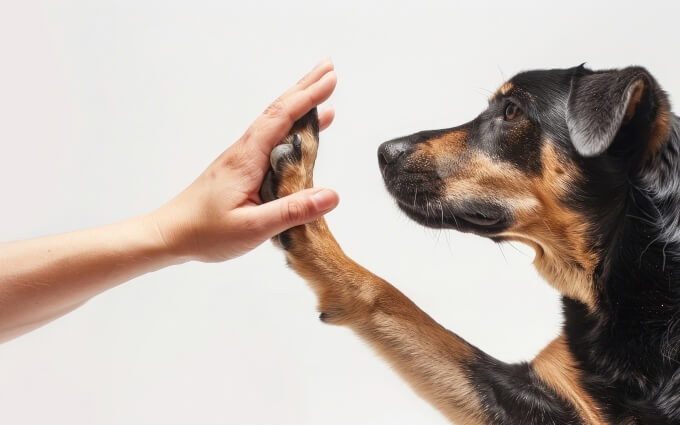- Home
- Puppies & Young dogs
- Why Is My Puppy Crying at Night?
Why Is My Puppy Crying at Night?
Find out why your puppy cries at night and explore practical solutions to help your furry friend feel comfortable and secure, ensuring better sleep for both of you.

- 50

Understanding the Nighttime Tears
So, your puppy is crying at night, turning your peaceful evenings into a symphony of whimpers and howls. It's a common problem that can stem from a variety of causes. Let's dive into the main reasons behind those nighttime sobs.
Loneliness and Separation Anxiety
One of the most frequent reasons puppies cry at night is loneliness. Just like human babies, puppies crave company and can feel anxious when left alone. They miss their littermates and mother, and your home is still a new, unfamiliar environment for them.
Need for a Toilet Break
Puppies have small bladders and might need to relieve themselves during the night. If they're crying, it might be a signal that they need to go outside. Typically, a puppy can hold its bladder for about one hour per month of age.
Hunger and Thirst
If your puppy is hungry or thirsty, it can lead to nighttime whining. Ensure they have a proper feeding schedule and access to water a few hours before bedtime.
Practical Solutions for a Peaceful Night
Now that we understand why your puppy might be crying, let's explore some effective strategies to help them - and you - get a better night's sleep.
Establish a Bedtime Routine
A consistent bedtime routine can work wonders. Spend the last hour or two before bed engaging in calm activities. Dim the lights, keep the noise low, and ensure your puppy has a final potty break.
Comforting Sleep Environment
- Make their sleeping area cozy with a comfy bed, a blanket, and perhaps a comforting toy.
- Consider a crate, which can make your puppy feel secure, like being in a den.
- Place the crate in a quiet, familiar location, and partially cover it to create a cave-like atmosphere.
Use Background Noise
Sometimes, soothing background noise, like a ticking clock or soft music, can help calm an anxious puppy. This can mimic the heartbeat of their mother or provide a sense of company.
Gradual Crate Training
If your puppy is not used to a crate, gradually introduce it as a positive space. Place treats and toys inside to create a pleasant association.
Midnight Comfort Breaks
If your puppy wakes up crying, take them out for a quick, calm bathroom break. Avoid engaging in play or giving excessive attention, as this can reinforce crying.
When to Seek Professional Help
Sometimes, despite your best efforts, the crying continues. If your puppy shows signs of illness, discomfort, or extreme anxiety, it's time to consult a veterinarian or a professional dog trainer. They can help identify any underlying issues and provide tailored advice.
Medical Concerns
Ensure there are no medical issues causing the crying. Common problems include urinary tract infections or gastrointestinal discomfort.
Behavioral Expertise
A qualified pet behaviorist can offer strategies and training techniques to help your puppy adjust to their new environment and routine.
Patience and Consistency
Remember, patience and consistency are key. Puppies are learning and adapting to their new world. With time, love, and the right strategies, those nighttime cries will soon become a thing of the past, paving the way for restful nights for both you and your furry friend.
Stick to your routine, provide comfort and security, and soon you'll both be enjoying peaceful, uninterrupted sleep.
Frequently Asked Questions about Puppies Crying at Night
Why is my puppy crying at night?
Puppies often cry at night due to loneliness, separation anxiety, or needing to go to the bathroom.
How can I stop my puppy from crying at night?
Provide comfort with a crate, soft bedding, and a consistent bedtime routine to help them feel secure.
Is it normal for puppies to cry when left alone at night?
Yes, it's normal as they adjust to a new environment and being away from their littermates.
Should I let my puppy sleep in my bedroom?
Many owners find it helps reduce crying, but it depends on your long-term sleeping preferences for your dog.
When will my puppy stop crying at night?
With training and comfort, most puppies adjust within a few weeks and cry less at night.
- 50
 Cassandra Dalgaard
Cassandra Dalgaard
Cassandra is an energetic dog owner who loves spending time outdoors with her 4-year-old German Shepherd, Max. They can often be found hiking in the woods, where Cassandra enjoys nature and Max explores his surroundings with great curiosity. Cassandra trains Max in tracking, an activity they both find very rewarding. In the evenings they relax at home, where Cassandra often reads a book while Max lies at her feet. Cassandra also volunteers at a local dog club where she helps organize training sessions and social events for dogs and their owners. For Cassandra, Max is more than just a dog - he's her best friend and faithful companion.
-
Food & Nutrition
 The Best Foods to Boost Your Dog's Immune System
The Best Foods to Boost Your Dog's Immune SystemTo keep your dog healthy and resilient, fueling their immune system with the right foods is key. In this post, we'll cover the top nutrient-packed foods that can give your dog's immune system the support it needs, helping them fend off illness and stay energetic.
 Marcin SolgaardOct 04, 20249
Marcin SolgaardOct 04, 20249 -
Puppies & Young dogs
 How to Puppy-Proof Your Home: A Complete Guide
How to Puppy-Proof Your Home: A Complete GuideBringing a new puppy home is thrilling, but keeping them safe means some serious puppy-proofing. This guide covers everything from securing hazardous items to creating a puppy-friendly zone, making your home a safe haven for your curious new companion.
 Michelle TorringOct 10, 202412
Michelle TorringOct 10, 202412 -
Dog Behavior
 Does My Dog Know I Care About It?
Does My Dog Know I Care About It?Discover the ways your dog shows it knows you care and how you can reinforce that loving bond through simple actions and daily interactions.
 Cassandra DalgaardAug 05, 202444
Cassandra DalgaardAug 05, 202444 -
Dog health
 Which Emotions Do Dogs Actually Experience? Understanding Your Dog's Emotions
Which Emotions Do Dogs Actually Experience? Understanding Your Dog's EmotionsDogs experience a variety of basic emotions similar to those of a young child. Learn about the emotions your dog truly feels, how they express them, and what it means for your relationship.
 Cassandra DalgaardJul 30, 202478
Cassandra DalgaardJul 30, 202478 -
Puppies & Young dogs
 New Puppy? Here's What You Need to Buy
New Puppy? Here's What You Need to BuyPreparing for a new puppy involves gathering essential supplies to ensure they have a comfortable and happy start in their new home. Here's your ultimate shopping list!
 Marcin SolgaardMay 06, 202448
Marcin SolgaardMay 06, 202448 -
Food & Nutrition
 How to Choose the Right Diet for Your Allergic Dog
How to Choose the Right Diet for Your Allergic DogFind out how to select the perfect diet for your dog with allergies. Learn about elimination diets, hypoallergenic foods, and the best ingredients to keep your furry friend healthy and happy.
 Marcin SolgaardJun 09, 202427
Marcin SolgaardJun 09, 202427 -
Dog health
 Essential Tips for Caring for Your Dog's Teeth and Gums
Essential Tips for Caring for Your Dog's Teeth and GumsMaintaining your dog's dental health is crucial for their overall well-being. This guide covers various methods to care for your dog's teeth and gums, ensuring they stay healthy and happy.
 Cassandra DalgaardAug 19, 202436
Cassandra DalgaardAug 19, 202436 -
Tips & Tricks
 How to Train Your Dog to Give Paw
How to Train Your Dog to Give PawTeaching your dog to give paw is a fun and rewarding experience that strengthens your bond. This guide walks you through the process with tips, tricks, and plenty of paw-sitive reinforcement.
 Marcin SolgaardApr 11, 202441
Marcin SolgaardApr 11, 202441 -
Tips & Tricks
 How to Train Your Dog to Walk Off-Leash
How to Train Your Dog to Walk Off-LeashThis guide will walk you through everything you need to know, from essential commands to mastering off-leash walks even in distracting environments
 Marcin SolgaardJul 02, 202451
Marcin SolgaardJul 02, 202451 -
Food & Nutrition
 Dog Supplements: When and Why to Use Them
Dog Supplements: When and Why to Use ThemDog supplements can enhance your furry friend's health by filling nutritional gaps and addressing specific health issues. Learn when and why to use them.
 Michelle TorringAug 28, 202432
Michelle TorringAug 28, 202432


